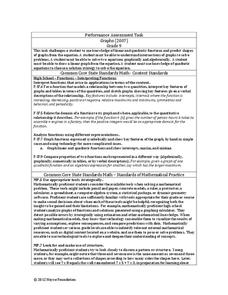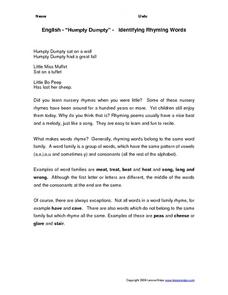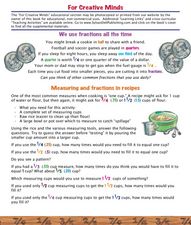Virginia Department of Education
Integers: Addition and Subtraction
Young mathematicians construct their own understanding of integers with an inquiry-based math lesson. Using colored chips to represent positive and negative numbers, children model a series of addition and subtraction problems as they...
Inside Mathematics
Graphs (2007)
Challenge the class to utilize their knowledge of linear and quadratic functions to determine the intersection of the parent quadratic graph and linear proportional graphs. Using the pattern for the solutions, individuals develop a...
Concord Consortium
Betweenness III
Don't let a little challenge get between your pupils and their learning! Scholars compare two absolute value functions to recognize patterns and use them to build their own functions with outputs that are between the given. They then...
K12 Reader
The Art of M.C. Escher
Show your class one way in which art and math are related by teaching them about M.C. Escher. Class members read a brief passage and then respond to five related questions.
Curated OER
Questions
Explore end punctuation with this multi-step worksheet on question marks. Scholars begin by finishing 10 sentences with either a period or a question mark. Consider discussing patterns they see at this point (first word, inflection,...
Curated OER
My Foot and the Standard Foot
Young mathematicians put one foot in front of the other as they learn how to measure length in an elementary math lesson. Using paper cutouts of their own feet, children measure classroom objects as they discover the importance of...
Central Bucks School District
Making Generalizations
Being able to recognize patterns, craft generalizations, and draw conclusions based on information in a text passage are essential critical thinking skills. Encourage learners to hone these skills with a instructional activity that asks...
Curated OER
Pea Plant Punnett Square Worksheet
How often do you find a science worksheet that comes with separate teacher's instructions? Here is one of those rare instances. Goals and objectives, materials, and evaluation guidelines precede the actual assignment. Biology leaners...
Curated OER
Mean and Standard Deviation
Get two activities with one lesson. The first lesson, is appropriate for grades 6-12 and takes about 20 minutes. It introduces the concept of measures of central tendency, primarily the mean, and discusses its uses as well as its...
Curated OER
Phonetic Skill 4
In these phonetic skills worksheets, learners complete several activities that help them learn to recognize phonetic patterns in words. Students complete 6 activities.
Curated OER
Division Word Problems Three- Version 1
In this word problems worksheet, students read the word problems and use division to solve the problems. Students solve 5 problems.
Curated OER
Connect the Dots - Letter Dd
In this dot-to-dot puzzle worksheet, students connect the dots using numbers one through twenty. Once both images are completed students must recognize the patterns that created a capital "D" and a lower case "d."
Curated OER
Connect the Dots - Letter E
In this dot-to-dot puzzle learning exercise, students connect the dots using numbers one through twenty. Once both images are completed students must recognize the patterns that created a capital "E" and a lower case "E."
Curated OER
Connect the Dots: Letter F
In this dot-to-dot puzzle worksheet, students connect the dots using numbers one through twenty. Once both images are completed students must recognize the patterns that created a capital "F" and a lower case "f."
Curated OER
Doppler Weather Radar
In this Doppler weather radar worksheet, students read about radar and Doppler weather radar and answer three questions about how they work and the Doppler effect.
Curated OER
English--"Humpty Dumpty"--Identifying Rhyming Words
In this rhyming words worksheet, students read Humpty Dumpty and begin recognizing rhyming words. Students unmix a mixed up batch of words by putting the words in 3 word family columns and list each one underneath one of the families....
Curated OER
We Use Fractions All the time
In this recognizing fraction usage worksheet, students measure fractions in recipes, match fractions and pictures, and compare pizzas. Students solve 18 problems.
Curated OER
Write Your Own i-e Poem
In this recognizing words spelled with the i-e pattern worksheet, students list words that rhyme, use word banks to fill in the blanks and use one or more to complete lines of a poem. Students write fourteen answers.
Curated OER
Reading: Consonant Vowel Consonant Words
In this recognizing words with the consonant vowel consonant pattern worksheet, students read a phrase and illustrate it, identify the phrases that identify the pictures, identify the sentences that correctly describe the pictures, and...
Curated OER
Various Questions
A great exercise for English language learners or youngsters learning how to question, this resource provides practice using pictures to recognize words. After the class has completed the fill-in-the-blank portion, have them walk around...
Silver Burdett Ginn
Study Buddies Skip-Counting Patterns
Two Study Buddies worksheets can be found through this link. In the first, math minors count flowers by 1s, and then again by 2s. They answer a few related questions. In the second, they are instructed to work with a partner and clap out...
National Security Agency
Multiple Representations of Limits
After an introductory activity to demonstrate the theory of a limit, additional activities approach a limit from graphical, numerical, and algebraic methods. The activity looks at the multiple ways of understanding and evaluating a limit.
It's About Time
Volcanic History of Your Community
Did you know there are 20 volcanoes erupting at any given time? Pupils look at various igneous rocks, read local geologic maps, and determine if their area has a history of volcanic activity. A reading passage and analysis questions...
Inside Mathematics
Squares and Circles
It's all about lines when going around. Pupils graph the relationship between the length of a side of a square and its perimeter. Class members explain the origin in context of the side length and perimeter. They compare the graph to the...























